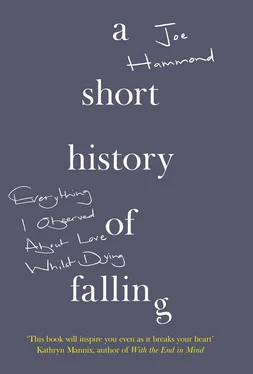She cupped Gill’s face in her hands.
‘Because Joe will be handicapped. His body will stop working. Almost completely. You will see.’
She was a little closer now. Almost nose to nose.
‘He will die. You know this, right?’
She took both of us by the hand.
‘You must love life. You must be happy!’
As Gill and I staggered along the concourse I felt I had to try and mention this thing about Dignitas. Or something like that. I’m not so brand-orientated that I would have insisted on Dignitas. I needed to admit to this general idea – to spit it out – but it felt like the mains had been turned off again or someone’s boot was stuck in the pipe. I was trying to talk. I was trying to cry. My hands were on my knees. I was trying to communicate but only spit came out. A thick, gloopy spit. Down my shirt and all over my trousers. And I was sweating. I was trying to say what I had now just remembered. My Dignitas plan. But Gill was pulling my arm, as if she thought this was not a plan but instead something to do with the piece of tarmac I was standing on. So that if she could pull me away from that spot I would be OK. How unlike tourists we must have seemed in that moment. Pulling and wrenching as doctors and porters and patients in hospital gowns parted around us.
*
Really bad news is a little like medieval weaponry. It isn’t precise like a bullet or a machine-sharpened blade. Part of its brute effect comes from blunt power, so that extensive collateral damage is caused to areas already weakened for a variety of other reasons: areas that are sometimes quite a long way beyond the originally intended location. In this sense, they both destroy and clear away. They bring forward endings in a more timely manner – tidying away what had already grown weak. And I think it’s not possible to be properly aware of such quiet, broad-reaching devastation, so that it’s only discovered later when performing an innocuous task – like reaching for some tinned tomatoes in a cupboard – and you notice some white part of the bone revealed in a place you would have never expected it.
I couldn’t have known it at the time, but a lot more became visible to me in the days following my bad news, and I don’t think I’m alone in being someone who walks around with all kinds of weaknesses that go back many years – almost as far back as it’s possible to go in a life. In the hours after Doctor Tiago diagnosed me I would not have been aware of this, of the soreness and the calcification that had existed for all this time. And that’s why the very worst kind of bad news – whilst seeming, of course, really bad – can also perform the same function as a brace applied to wonky teeth, or metal pins through the spine. It can take some time for its brutal benefits to become clear.
When I now look back at that early devastating comprehension of my condition, I see that it was necessary, in a way, to dig and scoop away at an area that should have long ago been knocked through – like a section of blown plaster after a leak; as if this wasn’t simply bad news, or advanced notice of a premature end, but also a long-overdue resolution.
*
I spent five days crying. There were intermissions when I could build fantastical, ornate wooden tower blocks with Tom. These periods enabled fresh fluids to be taken in, so that I could begin again at night-time or during the school day. During those nights I awoke several times to cry. Often I had just been dreaming of the diagnosis. And then, sitting up in bed, the expectation was that the day would flow in to dissipate and dissolve. When it didn’t, it was as if dreams had lost their function. It was an unschooling of the ways in which bad dreams are meant to be dispersed. Sleep was diminished. And waking was never quite achieved.
I had no previous facility for crying. No track record. I think I could take the image of Doctor Tiago in his white coat and replace it with one in which he wears a white hard-hat. Tiago the Engineer, overseeing a vast hydroelectric power plant. He had pressed a button or pulled a lever, because it began in that moment. It swelled up somewhere from a series of large, loosely fitted metal parts. So that I was just a vessel. A pipe. A tap. A drain. I was not the beginning and not the end. Something is running through me. I’m in the car or lying in bed and all the metal parts of Tiago the Engineer’s vast hydroelectric power plant burst and split, and then the water comes.
I now realize what Doctor Tiago and the other neurologists were doing. It was quite an artifice. I admire it now because it helped me a great deal. They dispersed my fears with their wonderful array of smiles. They needed me slouched against walls, bored, complacent. Because if I had been led incrementally towards diagnosis, I would never have gained entry to this vast hydroelectric power plant about which I had never previously been aware. They have to lead you towards it while simultaneously keeping it outside your field of vision. And suddenly, there you are, with other people who’ve made the same journey. Other recipients of this sudden violence. Perhaps they feel it in other ways: as a conscious fall from a high place or perhaps a sense of having misplaced something important, like the whole universe. In this place of vast latent power and unfathomable depth. And without this place, or outside this place, loss is never really felt. Outside, loss is dispersed, and becomes a kind of unseen haze. But here, down here, it’s felt. I found this out. Down here there is nothing but feeling it. The power of it.
I can walk for miles in this underground cavern and remain as I am. And I do. But up above my children are growing older. They’re living a life with Gill in a place I don’t know. And all the time I can see them from here. A life that works. The boys older. Life happening. I’m not getting closer to any of this. It just gets smaller and darker and fainter as it disappears into the distance. And then the water comes. And then it comes. And it does.
*
I was eating scrambled eggs, watching the milk pump out from Tom’s mouth as he spooned up his cereal. It was a natural and effective overflow that meant he didn’t have to regulate the amount of milk or cereal he was shovelling in. Gill had her back to us, making packed lunches, and over Tom’s shoulder I could see Jimmy trying to mount a sofa that was several hands too high for him. I got up and went through to the bedroom to lie down on my side. I pulled the pillow into my bottom lip and squeezed my face together, wringing it out, so that the pillow became damp around my eye socket. I could hear Gill telling Tom to get his shoes on. Then my diaphragm started chugging. It felt like hiccups but was more rapid and rhythmical. More like a pulsing. I rolled over on to my back and pulled the pillow into my teeth. There’s an ambient, wheezing noise that accompanies this kind of sobbing – a layer of treble that makes it sound as though I’m pleading for some kind of mercy. I had a toy once that made this noise when you turned it upside down. It was supposed to sound like a cow, but it was more like a smoker’s wheeze. I was tucking my knees into my chest and breathing more steadily now. I heard a door open in the next room, and Gill was stating something assertively. I knew that she was gathering up Tom’s schoolbag and I wanted to say goodbye. I could tell the episode was almost over and I sat up on the edge of the bed. This was the functionality of tears that I became used to in those five days. I knew I needed a moment after the exertion, like knowing when I need a cup of tea. I had my hands on my knees and looked around. Nothing had changed. Then I went back into the kitchen.
When the crying came at night, I’d be squeezing the duvet in my fists and thinking very acutely of the physicality of Tom and Jimmy. It must have been something close to focused meditation because I would imagine their current form, then focus in on the changes that I imagined would take place in their bodies in the years to come. I would imagine the lengthening of Tom’s lean legs and the broadening of his V-shaped jawline. I imagined the fine, fair hair that would appear on his face. I imagined his length and strength and the cheekbones that would one day underline his gaze. With Jimmy, I love and marvel at the width of his feet and hands. I imagine him continuing to be broad and solid. His shoulders would thicken and his jawline would be rounder than Tom’s. I imagined him shorter than Tom but more burly. In Jimmy’s case I also felt guilt that I knew his physical shape and form, but that he would never remember mine. He would often nap on the bed with his chin cupped in his hands and I would talk to his sleeping body and tell him how sorry I was.
Читать дальше











